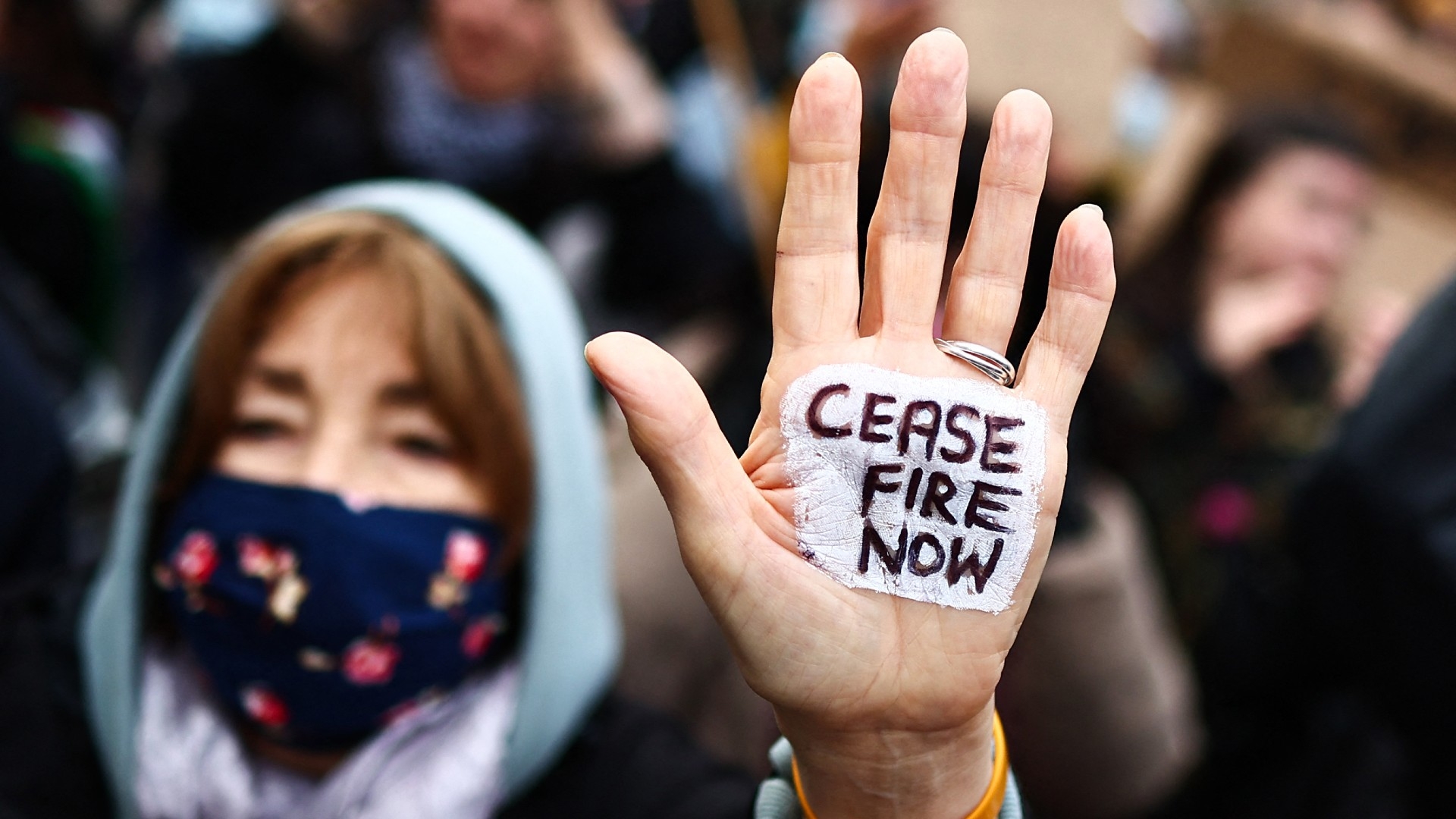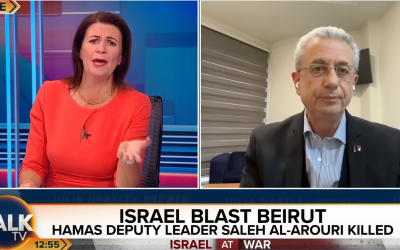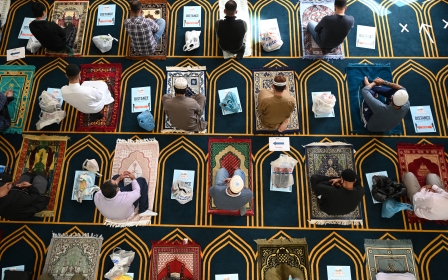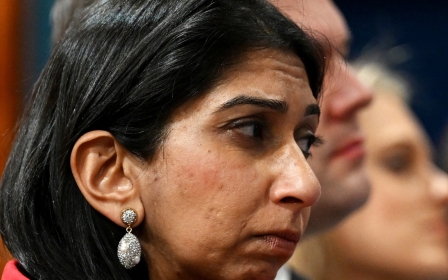Why British media is rife with anti-Muslim conspiracy theories

"Ofcom DO YOUR WORK for the love of God," reads one exasperated tweet. Many share this frustration in the wake of British TV presenter Julia Hartley-Brewer's recent tirade against Palestinian politician Mustafa Barghouti.
Brewer used a crude generalisation when berating the veteran diplomat, saying her Arab guest was "not used to women talking". More than 15,500 complaints have been submitted to the regulator since the episode. Many people are hoping that Ofcom will investigate and there will be some accountability, but they will likely be left disappointed, given how frequently Islamophobic tropes go unsanctioned on British television.
Hartley-Brewer was arguably emboldened to be so direct with her polemic precisely because of this environment of inaction. Just two weeks earlier, her TalkTV colleague Piers Morgan said the reason so many women were becoming Muslim these days was because they "want to be oppressed". There have been no sanctions of any kind.
Weaponising the stereotype of Muslims oppressing women may be a favourite of right-wing presenters, but as the treatment meted out to veteran Palestinian academic Ghada Karmi by two male presenters on TalkTV showed, women on the "wrong side" are also fair game for misrepresentation, abuse and silencing.
"Give me your answer, but don't tell me the history of the situation" was among many angry barbs directed by the two hosts towards Karmi, who was forced to flee her Jerusalem home during the 1948 Nakba. The hosts' insistence that she do away with the context, so personal to her, is a summation of what is expected of Palestinian guests in much of the western mainstream media's coverage.
In fact, the right-wing news echo chamber has found in the suffering of Palestinians an opportunity to promote anti-Muslim conspiracy theories. which, if said about any other community, would no doubt catch the attention of Ofcom, the UK's communications regulator.
These include conspiracy theories such as "Muslim voters are organising the Labour Party" and the party must "bow at the knee" to this constituency. This, after those who side with Palestine - including many Muslims - had the gall to question Labour leader Keir Starmer's justification of Israel's collective punishment of Palestinians.
Acceptable form of racism
Readers need no reminding that this is not the first time a particular religious group has been accused of wielding undue influence over Britain's Labour Party. But it is hard to imagine a presenter or journalist describing any other group of having "a worrying grip" on the Labour Party, as was said about Islam and Muslims by a GB News presenter. Is this what Ofcom considers free speech?
Tropes about Muslims being oppressors, bombers and rapists are frequently found on the opinion pages of mainly right-wing newspapers and magazines. The introduction of two right-wing channels has now made such views screen fodder. The assumption that broadcasting had a stricter set of rules, one that would never allow any racial or religious group to be targeted so brazenly, was clearly wrong.
Islamophobia is a significant pillar in the Fox-ification of British television, one that is given a free pass
This is yet another indication that Islamophobia has become an acceptable form of racism, from the dinner table, to the streets, to media and even to parliament.
This licence for falsehoods has also given rise to wild conspiracy theories, alongside attacks on Muslim advocates. On just one day last July, amid news of a prayer space being provided for Muslims in London's West End, a Talk TV host said this would "suck the guts out" of the community and was akin to a "takeover", or "the Muslim-ification of the West End".
If you flipped over to GB News, a banner across the screen read "Mass Killings" with a subhead noting that "hardline Muslim protests are a threat to social cohesion" - all because an organisation described as having an anti-Muslim agenda had said so.
As GB News faces censure from Ofcom over various offences, it is noticeable that none relate to conspiracy theories openly stated and left unchallenged.
Former presenter Mark Steyn, who eventually quit the channel after Ofcom investigated his claims on the safety of Covid-19 vaccines, has also given airtime to conspiracy theories against Muslims, including that women who wear the hijab do it as "an anti-western political sentiment" and that Islam teaches Muslims that “this land is for them and non-Muslims are just to be conquered". Ofcom has not taken action.
Singling out Muslims
Other tropes long since disproven are casually thrown around, a frequent one being that sharia law operates across large parts of the UK. It is not uncommon to watch a GB News show about any topic and find a panelist or presenter singling out Muslims.
The context in which Muslims are discussed views them as a unique problem, distinct from all other communities, faiths or otherwise. Imagine saying the following about any other group of people: "We are the architects of our own demise. Between 2011 and 2021, the total population of the whole country went up by 3.5 million; 33 percent of that total, 1.2 million, were Muslims."
The fact that one group of people can be singled out as an agent of the country's demise - and for that to be deemed acceptable speech by a public regulator - shows that Islamophobia is a significant pillar in the Fox-ification of British television, one that is given a free pass.
And what of those who do take the time to scrutinise and complain against the misinformation and targeting of certain communities? The case of Ella Cockbain, who told Ofcom that a GB News documentary on grooming gangs contained "multiple and grave breaches of accuracy and impartiality", is revealing.
Cockbain, an academic authority on child sexual exploitation, was abused on social media for publishing her complaint. When journalist Brian Cathcart suggested to Ofcom that it had a duty to stand up for Cockbain or any other complainant, the regulator responded: "We agree that no one should face violent threats, and anyone who has been targeted can report it to law enforcement authorities." Cathcart summarised this response as "not our problem".
Much of what Cockbain has described as "junk science" on grooming gangs is still repeated on right-wing news channels, with the lament that Muslims somehow receive special treatment in Britain.
When the British government announced a task force on grooming gangs in April last year, GB News acted less like a news broadcaster and more like a cheerleader, stating dozens of times that culture was the driving force behind the crimes committed. The words "mosques", "Muslims", "Pakistanis" and "primitive" were all frequently used.
In June 2021, Adam Baxter, Ofcom's director of standards and audience participation, acknowledged that GB News was "seeking to come from a right-of-centre perspective and there's nothing in the code that prohibits a broadcaster coming from a particular perspective".
The question for Ofcom today is: does this right-of-centre perspective mean you can abuse guests who might have a different viewpoint, or launch conspiratorial diatribes against one section of the population or one religion? Their inaction would suggest yes.
An Ofcom spokesperson told Middle East Eye: "The Ofcom Broadcasting Code contains a number of rules to protect audiences from harm, and broadcasters, whatever their editorial perspective, have the editorial freedom to decide how they achieve compliance with those rules. We apply the Broadcasting Code to all our regulated services fairly and proportionately. We assess every complaint we receive, and where we have cause to investigate, we publish fully reasoned decisions based on the evidence."
The views expressed in this article belong to the author and do not necessarily reflect the editorial policy of Middle East Eye.
Middle East Eye propose une couverture et une analyse indépendantes et incomparables du Moyen-Orient, de l’Afrique du Nord et d’autres régions du monde. Pour en savoir plus sur la reprise de ce contenu et les frais qui s’appliquent, veuillez remplir ce formulaire [en anglais]. Pour en savoir plus sur MEE, cliquez ici [en anglais].






